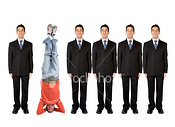 One of the biggest concerns my executive clients have is how to use social media in their job search. They know that it's the new kid on the job search block, but they themselves have rarely gone beyond a bare bones LinkedIn profile (LIP). Facebook evokes shudders of horror, and Twitter is deemed trivial.
One of the biggest concerns my executive clients have is how to use social media in their job search. They know that it's the new kid on the job search block, but they themselves have rarely gone beyond a bare bones LinkedIn profile (LIP). Facebook evokes shudders of horror, and Twitter is deemed trivial.
Some rethinking might be in order. Life calls on us to go out of our comfort zone on occasion - and this may be one of those times. See what you think about these steps to start actively leveraging the good in social media to promote your personal brand for job search and career advancement. Do they feel doable to you?
1. When you see a job you're interested in anywhere, use LI to connect with a couple of managers in the company that posted the job. Ask for 5-10 minutes of their time - say that you are interested in the job and want to find out a little bit about company culture, trends, etc. If it feels comfortable, request that they forward your resume to the hiring manager (not HR - submit that separately as instructed in the job ad). Why would they help you? Employees frequently get financially rewarded for referring a candidate that gets hired.
2. "Rinse and repeat" for your other social media sites: Identify employees, ask for a brief conversation, ask that they forward your resume to the hiring manager.
3. Reach out directly through LinkedIn to the recruiter or hiring manager. Express interest. Send your resume.
4. On Facebook, go to the company pages set up by your target companies and "Like" the company (recruiters say they notice "likes" more than comments!).
5. Expand your online footprint, so that when your name is Googled (and it will be!), you show up, on brand, in a number of places, not just LinkedIn.
6. Search for jobs on LI, Twitter, and Facebook every day or every other day. They (and job apps created around them) all have extensive job listings. To find third-party apps, Google like this: "[Twitter] job search."
7. Watch the activity of companies you are targeting. If you see they are going through M&A (mergers and acquisitions), opening up new offices, expanding product lines, etc., use that information to position yourself as a "solution" in a letter direct to the hiring manager (US Mail) or via email.
This is a limited list, but if you implement some or most of these items, you will be in a good position to both attract recruiter interest and get interviews. Practice until you become adept at leveraging the personal promotional potential of social media sites. Take the advice of my client who "poo-pood" these suggestions at first and now uses Twitter almost exclusively for Healthcare IT professional information. Do it and see. You'll be glad you did.
Tags: LinkedIn, Twitter, networking, social media job search, Pinterest, youtube





-resized-600.gif?width=185&height=117&name=image-worldofwork-wow_cloud_(homepage)-resized-600.gif) This is Part 2 of my blog posts on what executive recruiters are looking for in executive candidates. Wayne Mitchell of Cabot Consultants listed the qualities he likes to see in candidates he will present to his clients:
This is Part 2 of my blog posts on what executive recruiters are looking for in executive candidates. Wayne Mitchell of Cabot Consultants listed the qualities he likes to see in candidates he will present to his clients: William Arruda, The Personal Branding Guru, is known for "seeing around the corner."
William Arruda, The Personal Branding Guru, is known for "seeing around the corner." 

